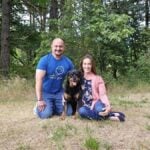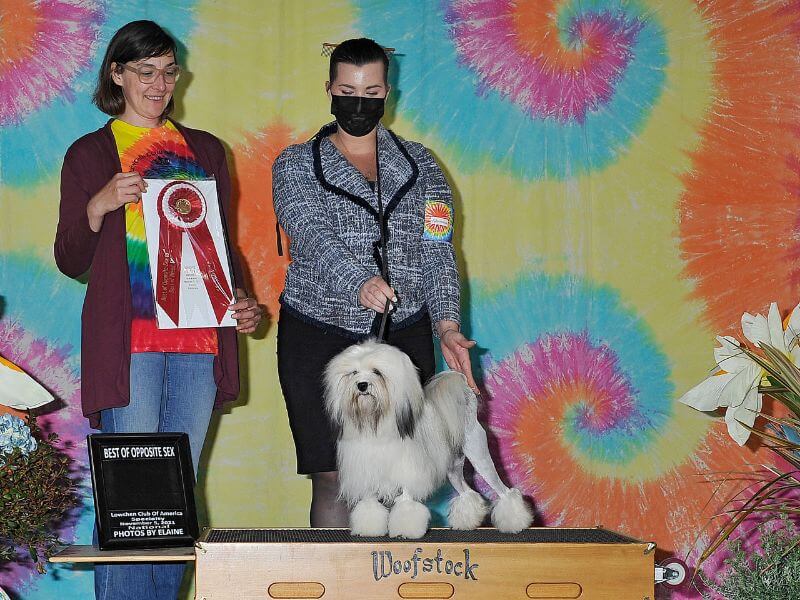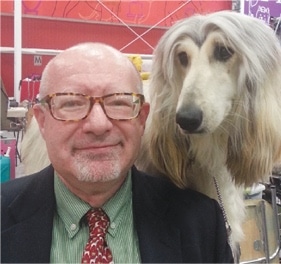


Home » Alexia Rodriguez | Potrero Cane Corsos and Lowchen

Alexia Rodriguez: I grew up in Catonsville, Maryland, in the 1980s and ‘90s. My mom was a single mother who had never owned dogs. Around age 11 or 12, I began to really want a dog. My mom made me go to the library and start reading about dog breeds. She had minimal, yet strict, parameters for any potential dog. It had to be small, and couldn’t be a barker.

She was especially insistent that we find a breed of dog called a Japanese Chin. In the books we read, it said they were small and didn’t bark. My mother also knew this was an extremely rare breed, so she figured we would never find one in the newspaper. In 1988, the only way we knew to find a dog was to look at the classified listings or go to a pet store. After what felt like an eternity of studying dog breed books and scouring the newspaper each Sunday, we happened to go to a pet store at the mall. Lo and behold, there sat a black-and-white Japanese Chin puppy! My mother didn’t have much money and I remember her putting the purchase on a credit card. I was absolutely ecstatic! We named him Ureshi Mitsu and he was my life.

A few months after buying him, a flyer circulated at school for a “fun match dog show.” I remember the flyer said, “ALL AKC REGISTERED BREEDS ALLOWED.” I was so excited because my Japanese Chin was AKC registered and I could hardly wait to go to the show and do something with my dog. We arrived at the fun match and I had no idea what class to enter, but the one that said “Junior Showmanship” sounded appropriate so that’s what we entered. I placed fourth in a class of five and I was hooked!

Alexia Rodriguez: My early mentors growing up were George and Sherrie Howes of Hiswill Hounds, Chad Howard of Chaseland, and Faith Milton of Huang Kung Japanese Chin. As an adult, I’ve been lucky enough to have many mentors and like-minded individuals who I can collaborate with on breeding plans, talk openly about temperament and structure, and ask for feedback on challenges that come up. I feel very fortunate to have surrounded myself with a small group of breeders who share a similar vision for the future of our breeds.

Alexia Rodriguez: With the Corsos, if you want to make lasting improvements in the breed, you have to have what I call a “healthy appetite for risk and an even healthier dose of optimism.” The Corso has a lot of challenges when making choices for breeding. Temperament, health, and working ability are the top three things I always consider when putting two dogs together. Temperament has ALWAYS been and always will be my NUMBER 1 factor in any breeding decision. For me, no amount of perfect conformation traits, titles, or wins will warrant using a dog with a poor temperament in my breeding program. This goes for the Lowchen as well.

In Lowchen, when I was planning my first few litters, I relied heavily on my mentor, Gillian Robertson, to guide me with regard to choosing which pedigrees to move forward with. Gillian was instrumental in helping me define what I wanted, offering me history on the dogs in each pedigree, and helping me choose those early puppies to move forward with.
Now I feel I have established a type that I prefer and is prominent when you see one of my Lowchen. The tough part in Lowchen is getting enough dogs to outcross to and keep the type strong and consistent. By partnering with fellow Lowchen breeder Jennie Chen, she and I have managed to help make this happen. I jokingly call her “my enabler.”

Alexia Rodriguez: In addition to breeding, I am also a professional dog trainer. We have about 10 to 15 dogs on the property at any time.

We have four Corsos that are permanent residents and four Lowchen that are also permanent residents. We also have a pet Frenchie as well as a Malinois for sporty things. We have two big dogs that live in the house full-time, along with the “littles.” Everyone else is in our kennel. I have outdoor runs on concrete for daytime use, but at night or when we aren’t home, everyone is crated in a temperature-controlled building. We also have acreage and live in a very rural area. I am able to let the dogs run our property and go on hikes in our locality. It’s important to me that I give each dog individual attention every day, either by training them or exercising them with a run. I feel fortunate to be able to make my living as a professional dog trainer, which allows me this flexibility in my daily routine.

Alexia Rodriguez: Cane Corso: I was asked to judge the CCAA Top 20 event in Houston, in July 2023. I was pleasantly surprised that the dogs and bitches were of correct size and substance, with pleasing headpieces and seemingly stable temperaments. In the past, the trend had been to promote dogs that were oversized. Now I see the trend going back to producing a more functional animal, which is a major, positive shift. I’m also seeing more Corsos competing in performance as well as conformation. This is a wonderful trend for our Working breed.

Lowchen: At our National in June 2023, in Vallejo, California, the competition was truly stunning. You could have made a case for most class animals to win points. The Best of Breed class was exceptional. I believe the depth of quality has increased tremendously since I started.
I also see a major uptick in popularity of the breed, at least on social media. With the very few breeders we have and the small litter sizes, I don’t feel limited popularity is a bad thing. We need people to want Lowchen as companions just as much as we need folks to want them as competition dogs.

Alexia Rodriguez: I think that in order to attract and keep new folks, we’ve all got to relax. Relax our dress code, relax our emotions, relax our judgment, and relax our complaining on social media.
If we look at the shows that attract the most exhibitors and spectators, I notice that the kennel clubs that make the experience fun, with casual dress and a theme that everyone can take part in, are some of the most well-attended and talked-about dog shows. Being a West Coast person, I obviously look at Woofstock as an example.

Another improvement could be making entering a dog show easier to do online. Have you ever coached a new owner through entering their dog in a show? It’s daunting and very confusing, unless you have someone walk you through it step by step. I think that superintendents need to update their online systems with responsive website design as it relates to the entire system. I feel this is more urgent than updating with real-time results.
While I, too, value longstanding dog show traditions and the prestige of our most famous dog shows, we need to understand that for the regular person, those types of shows can feel intimidating and not a realistic hobby. We need to market our hobby as an inclusive and fun place for a family to attend, and hopefully participate in together.
I love the idea of having special attractions like agility tryouts or obedience tryouts which offer same-day entry. We need to market these events in our community more effectively. Perhaps school flyers with details for an upcoming, local dog show would be a great way to get more spectators out to attend.
Alexia Rodriguez: In 10 or 20 years, I hope that I’m able to continue to produce quality dogs that excel in whatever venue they are placed in. I also hope to dabble in a Sporting breed down the road. I absolutely love the pointing breeds and really want to immerse myself in hunting dog training at some point.

I also hope that the new generation of people I’m helping now will continue to breed and produce great dogs.
In Cane Corsos, I hope that we are able to find a genetic marker for epilepsy in my lifetime. In Lowchen, I hope we are able to continue to expand the breed’s popularity as a companion, and attract more experienced breeders who can continue the breed on its current path.
